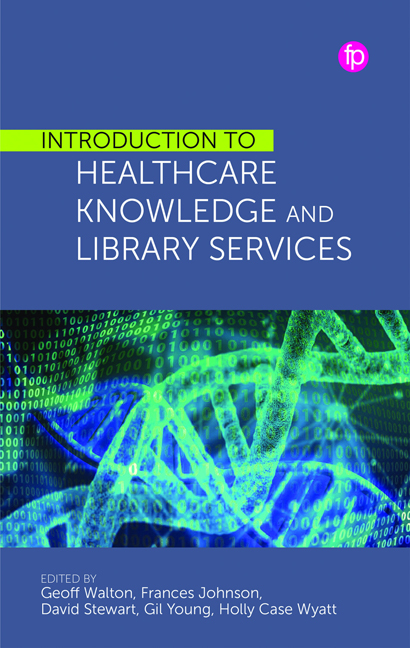Book contents
- Frontmatter
- Contents
- Figures, Tables and Case Studies
- Notes on Contributors
- Foreword
- How to Use this Book
- 1 An Introduction to Healthcare Knowledge and Library Services
- 2 Strategic Development for Healthcare Knowledge and Library Services
- 3 Exploring the Training and Development Needs of the Healthcare Knowledge and Library Services Workforce: A Case Study
- 4 Advocacy and How Knowledge and Library Specialists Tailor Services to Meet the Needs of Their Stakeholders
- 5 Mobilising Evidence and Knowledge
- 6 Internal and External Partnerships
- 7 Health Literacy, Patient Information and Combating Misinformation
- 8 Resource Discovery and Open Access
- 9 Growing the Evidence Base in Healthcare Knowledge and Library Services
- 10 Measuring Progress, Value and Impact in NHS Knowledge and Library Services
- 11 Reflective Practice in Healthcare Settings
- 12 Looking to the Future of Healthcare Knowledge Services
- Index
7 - Health Literacy, Patient Information and Combating Misinformation
Published online by Cambridge University Press: 22 February 2024
- Frontmatter
- Contents
- Figures, Tables and Case Studies
- Notes on Contributors
- Foreword
- How to Use this Book
- 1 An Introduction to Healthcare Knowledge and Library Services
- 2 Strategic Development for Healthcare Knowledge and Library Services
- 3 Exploring the Training and Development Needs of the Healthcare Knowledge and Library Services Workforce: A Case Study
- 4 Advocacy and How Knowledge and Library Specialists Tailor Services to Meet the Needs of Their Stakeholders
- 5 Mobilising Evidence and Knowledge
- 6 Internal and External Partnerships
- 7 Health Literacy, Patient Information and Combating Misinformation
- 8 Resource Discovery and Open Access
- 9 Growing the Evidence Base in Healthcare Knowledge and Library Services
- 10 Measuring Progress, Value and Impact in NHS Knowledge and Library Services
- 11 Reflective Practice in Healthcare Settings
- 12 Looking to the Future of Healthcare Knowledge Services
- Index
Summary
Introduction
In this chapter, we explore definitions of health literacy in relation to individuals and wider society. We will examine which groups in society are more likely to be affected by low health literacy and describe how having low health literacy impacts on a person’s health and wellbeing and the services that support them. We’ll also set out tools and techniques that can help people with low health literacy and promote health literacy in practice. Finally, we outline the context for work by health library and knowledge specialists in promoting health literacy.
What is health literacy?
Health literacy can be defined in relation to an individual and to wider society.
Individuals
For an individual, health literacy describes the extent to which a person can find, understand, use and apply health information as well as interact with healthcare services to make health-related choices for themselves and others. Health information behaviour and health literacy are complex phenomena that have received much attention in information behaviour research, such as how people engage with or avoid health information (Saironen and Savolainen, 2010). Critical health literacy (Sykes et al., 2013) is one notion that has been employed to empower individuals to make informed decisions. However, information behaviour research demonstrates that whilst some individuals will readily seek health information, some will actually actively avoid it in order to reduce the risk of experiencing negative emotions such as fear, anxiety and depression (Saironen and Savolainen, 2010; Case and Given, 2016). Although the vast majority of people will seek health information to reduce anxiety, for some, engaging with health information can increase their anxiety (Pifalo et al., 1997).
Society
For a society or healthcare system, health literacy relates to the provision of information and services in a way that is accessible to all and empowers people to make informed healthcare decisions. However, the COVID pandemic and the scare regarding the link between the Measles Mumps and Rubella (MMR) vaccine and autism (Lewandowsky et al., 2012) have put into stark relief how health misinformation can spread, often quicker than good quality information (Spring, 2020). The term ‘infodemic’ aptly describes the former phenomenon (Zaracostas, 2020). What we can conclude from this is that, as health information professionals, it isn’t simply a question of providing good quality health information, there is also a need to actively combat misinformation and deliberate disinformation which is so easily available via the internet.
- Type
- Chapter
- Information
- Introduction to Healthcare Knowledge and Library Services , pp. 103 - 124Publisher: FacetPrint publication year: 2024



